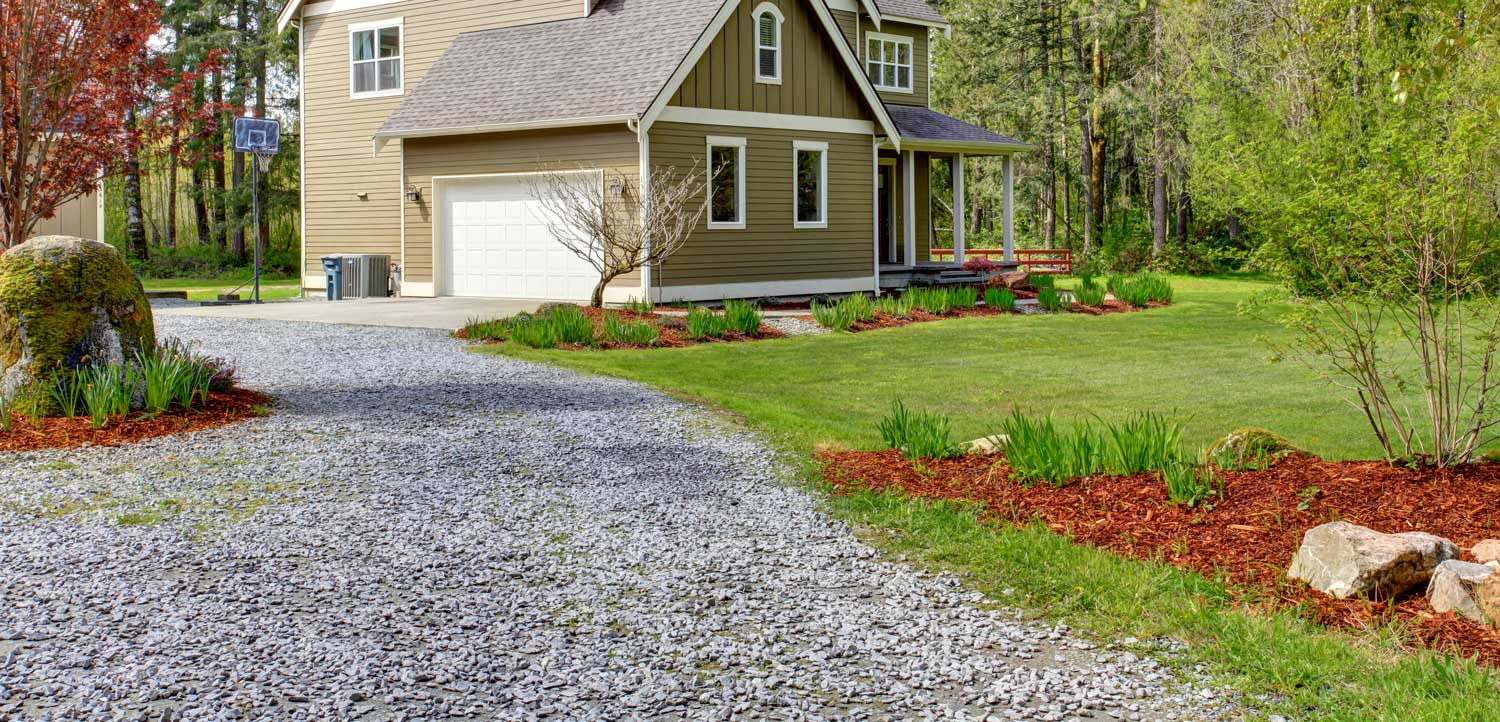2025 Gravel Driveway Cost Guide
Choosing a gravel driveway has its advantages: it can add rustic charm to the front of any home, it's easy to install and maintain, and it's much cheaper than concrete or asphalt. Let's find out more details about how much it costs.
2025 Gravel Driveway Costs
Calculate local project costs by entering your zip code.
Custom Location
| National Average Price | $2,000 |
| Typical Price Range | $1,500 - $6,000 |
| Typical Price Range (per square foot) | $1 - $3 |
On this page:
How Much Does a Gravel Driveway Cost?
If you’re wondering how much a gravel driveway costs, you’ll be happy to know that it is the most affordable material used to create a driveway. Most pay around $2,000 for labor and materials for a 100-foot-long driveway that is 10 feet wide.
The price for a gravel driveway usually averages between $1 to $3 per square foot.[1]

Material Costs
Gravel ranges in price depending on the type of gravel selected and the geographic location. Most often, driveway gravel ranges from $15 to $75 per cubic yard, depending on the type used.
Keep in mind that many gravel driveways will use different materials for the base and top layers, which can give you varying costs for material. Distance to the supplier is an important consideration, as transportation and delivery costs will vary by distance.
The size of the driveway and the depth of the gravel will determine how much material is needed for the job. Use our gravel driveway calculator to calculate the amount of material needed for the project.
Labor Costs
Labor costs will vary based on the depth of the driveway, the amount of preparation needed, and the complexity of the project. Labor typically runs $40 to $55 per hour for a driveway installation but varies by geographic region.
Equipment Costs
Installing a gravel driveway is no small task. The job requires heavy equipment and a machine to move substantial amounts of gravel from one end of the driveway to the other, and a tool that would efficiently grade and level it.
For this reason, unless you have access to this machinery, it’s most common to have a gravel driveway professionally installed. The cost of the equipment is factored into the total costs of the job.
Factors to Consider
The main factors to consider when calculating how much a gravel driveway costs include the size of the proposed driveway, the price and quality of the gravel you choose, the thickness of the gravel layer, delivery cost, and labor costs.[2]
You can also reduce the overall cost by furnishing the hidden layers with cheaper or less aesthetically pleasing gravel while saving the best stuff for the top. This is very common, as the base layer usually has larger gravel to facilitate drainage, while the top layer has smaller, more attractive gravel.
The Long-Term Cost
There is another aspect of cost involved with a gravel driveway that you may not initially consider: long-term value. Gravel shifts over time due to the pockets of space between each tiny pebble. If you’ve never had a gravel driveway before, the regular maintenance required might be a deciding factor.
Due to its shifting, you will occasionally have to top-dress, which means that surface gravel will need to be added or replenished with new gravel. Top-dressing should be done every few years or when you notice it’s starting to lose its aesthetic appeal or effectiveness.[3]
Other possible problems caused by a gravel driveway include ruts or potholes, as well as stray pebbles finding their way onto the grassy lawn or in other unwanted places.
If you live in a climate that sees a lot of snow, keep in mind that even careful plowing can move your gravel around. Each spring, you will need to rake back the piles of gravel from where the plow has pushed them. Gravel can also break the pins in a snow blower, making it difficult to keep your driveway clear.
Regular maintenance completed by you, the homeowner, will help to sustain the longevity of the gravel, however. To keep such disarray to a minimum, rake the gravel approximately once a month. Doing so will help maintain your gravel driveway and will save you money in the long run.
Finally, one more long-term factor that should be considered before you choose to create a gravel driveway is nature itself. Because gravel is a permeable driveway surface, weeds can creep up through the pebbles.
Keeping the area treated with weedkiller or pulling up weeds regularly is an added component that can create additional cost and effort, so bear this in mind before you come to a final decision.
Compare the cost of gravel to other driveway materials like asphalt or concrete.
All pricing information on this page is based on average industry costs, and is subject to variance for project-specific materials, labor rates, and requirements.
Similar Home Improvement Calculators
References
- Jeff Beneke, Pros and Cons of a Gravel Driveway, The Spruce, https://www.thespruce.com/pros-and-cons-of-gravel-driveway-1398078
- Tigard Sand and Gravel, 4 Gravel Driveway Benefits, https://www.tigardsandandgravel.com/348-2/
- Wolf Paving, 3 Driveway Pros & Cons: Gravel Vs. Asphalt Paving, https://www.wolfpaving.com/blog/3-driveway-pros-cons-gravel-vs.-asphalt-paving


